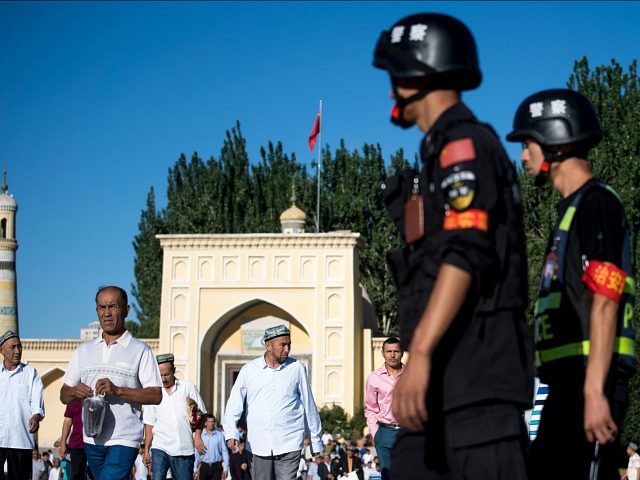China’s People’s Liberation Army (PLA) has intensified its counterterrorism and border patrol activities in the Muslim Uighur-majority province of Xinjiang, which borders Afghanistan and Pakistan-controlled Kashmir, the state-run Global Times reported Monday.
The report comes amid what human rights groups have described as increased efforts by China to repress its ethnic Uighur (or Uyghur) Muslim majority in Xinjiang, a move that has prompted some Uighurs to flee across the border into Afghanistan.
Even China’s top ally Pakistan urged China to take steps against the alleged human rights abuses and repression of ethnic Muslim Uighurs in Xinjiang in September, marking one of the first public criticisms from a predominantly Muslim country of Beijing’s policy in the province.
To the dismay of the international community, China has allegedly forced hundreds of thousands of Uighurs into concentration camps, also known as re-education centers, as part of Bejing’s efforts to bring them back into the fold of the country’s Communist Party, an accusation that Bejing denies.
China argues that the re-education camps are vocational centers intended to combat the “three evils” of separatism, terrorism, extremism allegedly afflicting the Uighur community.
Now, the Global-Times is reporting that China is expanding its military activities in Xinjiang, the largest province in the country, in the name of counter-terrorism and border security. The state-run news outlet revealed:
A Chinese army aviation brigade stationed in Northwest China’s Xinjiang Uyghur Autonomous Region has upgraded its training in high-altitude and in adverse weather, a move that experts say will facilitate counter-terrorism and border patrol missions under extreme conditions.
The brigade conducts 44 percent of its training at night. High-altitude and tactics training increased by 40 percent compared to last year, the Xinjiang Daily reported on Sunday.
On Monday, Wei Dongxu, a Beijing-based military analyst, told the Global Times, “The training guarantees the aircraft are well maintained, and soldiers are ready for combat,” adding that the aviation forces will be able to quickly deploy soldiers, and will, therefore, be “efficient in strikes against terrorist activities.”
In addition to its complicated topography, Xinjiang’s long border with various countries — including Mongolia, Russia, Kazakhstan, Kyrgyzstan, Tajikistan, Afghanistan, Pakistan, and India — “means effective aviation forces are necessary in routine missions like border patrols,” Dongxu pointed out.
Bejing’s crackdown on Muslim Uighurs has triggered an “exodus” into bordering Afghanistan, Foreign Policy (FP) recently reported, adding, “Chinese oppression and ethnic conflict in Xinjiang are helping to further destabilize Afghanistan and turn young Uighurs, increasingly targeted by the Chinese state, toward violent resistance.”
FP further noted, “In light of the restrictions placed on Uighurs by authoritarian governments in Central Asia, war-torn Afghanistan has been the only neighboring country where it is politically and religiously safe for Uighurs to seek refuge, especially in Taliban-controlled areas.”
Chinese Uighurs have been linked to al-Qaeda and Taliban-affiliated jihadi groups like the East Turkestan Islamic Movement (ETIM) and the Turkistan Islamic Party (TIP).
Although Xinjiang does not border mainland Pakistan, it borders the portion of Kashmir — a Muslim-majority territory claimed by Beijing, New Delhi, and Islamabad — controlled by Pakistan, where various jihadi groups, including al-Qaeda and the Islamic State (ISIS/ISIL), operate.
The U.S. has determined that China is facing a growing terrorist threat from Pakistan-occupied Kashmir (PoK) and to a lesser extent Afghanistan.
According to the U.S military, the Afghanistan-Pakistan region is home to the “highest concentration” of terrorist groups in the world, including al-Qaeda, ISIS, and the Taliban.
Uighur (or Uyghur) members of al-Qaeda and ISIS have threatened to attack China. Jihadis from the Uighur community who train in the Afghanistan-Pakistan region have carried out attacks in China in the past.

COMMENTS
Please let us know if you're having issues with commenting.